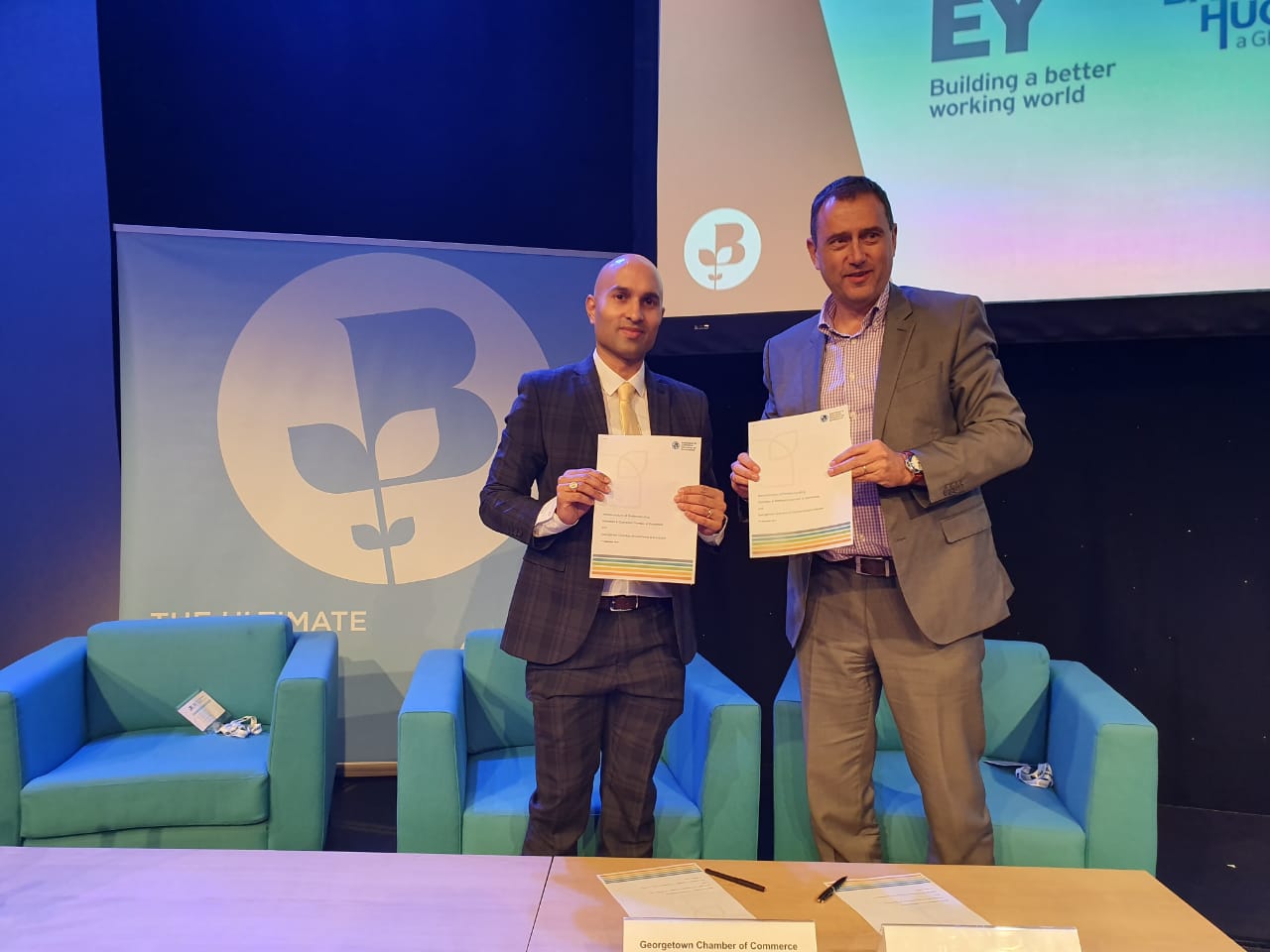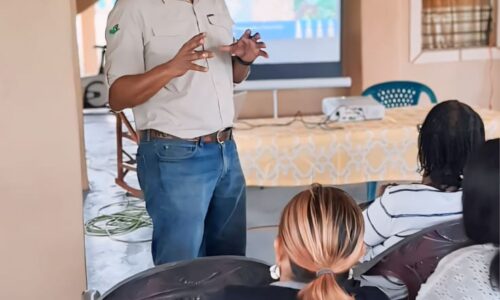Local content policy will not scare us – European investors tell Guyana’s contingent
(KAIETEUR NEWS) Despite recent assertions by US Ambassador and Co-Chair of American Chamber of Commerce (AmCham), Sarah-Ann Lynch, that recent advocacy for local content policy and legislation in Guyana could serve to create a situation that would scare away investors, European investors appear to be much more accommodating than their American counterparts (as portrayed by Lynch) of the need for Guyanese to participate fairly in the Petroleum sector.
During a recent press conference co-chaired by the Guyana Office for Investment (GO-Invest) and the Georgetown Chamber of Commerce and Industry (GCCI), President of the Chamber, Nicholas Deygoo-Boyer, said that his interactions with European companies indicate that they are happy to work with Guyanese as partners.
Deygoo-Boyer recently returned from Aberdeen, Scotland, where he formed part of a local contingent representing Guyana at the Society of Petroleum Engineers (SPE) Offshore Europe Conference & Exhibition, a biennial conference focusing on upstream oil and gas.
Chief Executive Officer of GO-Invest, Owen Verwey, said at the conference “There have been some big discoveries and, by next Friday, we will be announcing another one”, but noted cautiously at yesterday’s press conference that the remit of announcing discoveries is that of the Department of Energy.
Guyana made presentations at the event, including an Energy Industries Council (EIC) Guyana-specific event, where the contingent met with several companies interested in entering the Guyanese Petroleum market.
Deygoo-Boyer said that a discussion with investors was centered around local content policy, based on the draft received from the Department of Energy.
He noted that, having had a number of meetings during the conference, he “did not find anyone who felt disenchanted, disheartened or uninterested in the market, because there was talk of implementation of a local content policy and, possibly, legislation.”
He assured that they all understood local content policies and legislation as staples of countries that produce oil, or have other extractive industries, all over the world.
The companies’ representatives said, according to Deygoo-Boyer, that they are happy to work with Guyanese as partners, as well as hiring Guyanese to train them, so that they can satisfy local content requirements. He said that they noted, regardless of the policies in place, that they would recognise and respect the value of local content, but that a good policy would help them to understand the framework in which to observe that duty, and “gives them guidelines in terms of how to plan so that they can tailor their operations in Guyana to suit.”
“It was very heartening to hear people interested in the market, and wanting to do business in one of the hottest destinations,” Deygoo-Boyer said.
Pursuant to facilitating those partnerships, the GCCI, while in Scotland, signed a Memorandum of Understanding (MoU) with the Aberdeen & Grampian Chamber of Commerce. A release from GCCI states “The MoU is intended to create and strengthen links between the two Chambers for the enhancement of trade and for information sharing relating to issues of policy and trade development.”
Deygoo-Boyer said that the Chamber is interested in bringing its experience and expertise in the North Sea oil and gas industry to Guyana.
“That Chamber holds a number of businesses who sell products and services into the oil industry and are interested in exporting those products and services to the Guyanese market,” Deygoo-Boyer said.
He explained that local companies will be able to create supply chains for those products and services by forming joint ventures with those companies who control existing technologies and have the “know-how” to make that happen.
There is expected to be cooperation in future on practical ways for the Chambers to lend support to each other, with the assistance of partners such as the British Chambers of Commerce, Scottish Chambers of Commerce, the Scottish Department of International Trade, the Scottish Development International and other bodies.
Deygoo-Boyer’s remarks come nearly two weeks after the first Annual General Meeting for AmCham Guyana at the Marriott Hotel, where the US Ambassador said that “at a time of increasing integration, especially in a globalised energy sector, focusing on who owns a firm is counterproductive”.
“For example, some recent suggestions about local content policy in Guyana may send a signal that some investors as well as the employment and know-how benefits they bring may not be welcome here,” Lynch had said.
Her comments followed a Georgetown Chamber of Commerce and Industry (GCCI) forum at Duke Lodge, where speakers stressed the importance of local content policy and legislation to ensure Guyanese directly benefit from the proceeds of First Oil.
The Ambassador’s words are in contrast with a statement by AmCham President, Zulfikar Ally, who noted Guyana’s history of granting exorbitant concessions to foreigners to lure them to Guyana’s shores, urging that that practice must come to an end.
Senior Vice President of GCCI, Timothy Tucker, had also spoken on the issue, saying of Lynch’s comments, that she is doing her job as a public servant of the United States, by advocating in the best interests of businesses from that country. He had added that Guyana and the Georgetown Chamber will advocate for its own.
The document at the centre of these discussions is the third draft of the Local Content Policy.
In February, Director General of the Ministry of the Presidency, Joseph Harmon, had announced that British Oil Consultant, Dr. Michael Warner, was hired to complete the final draft of the policy. Warner, who has no track record of independently producing a local content policy for a country, was awarded a $22M contract.
Subsequent to that announcement, Kaieteur News had confirmed with former Business Minister, Dominic Gaskin, that this contract was never advertised.
Kaieteur News had also raised several questions about Dr. Warner’s connection to ExxonMobil, the firm that brought him to Guyana in the first place to train local businesses trying to access the supply chain.
Dr. Warner was actually a fixture at Exxon’s Centre for Local Business Development on South Road for this matter.
The Local Content Policy he produced has been heavily criticised for its provisions, or the lack thereof, which favour foreigners, instead of Guyanese, for whom it should be purposed to advocate.






